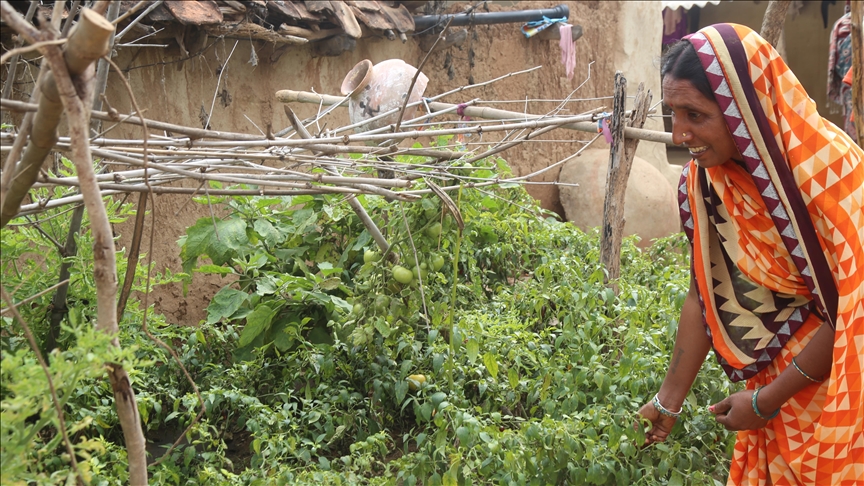Kitchen gardens help indigenous in India combat malnutrition
Project started 5 years ago as community-based malnutrition management

NEW DELHI
An initiative by a civil society organization in central India is proving a lifesaver for the poor and indigenous forest-dwelling people of the area.
The project was started five years ago as part of a community-based malnutrition management scheme of Vikas Samvad, an NGO based in the central state of Madhya Pradesh. The project focused on setting up kitchen gardens for 500 families.
As we celebrate World Food Day on Saturday, the effort of the organization not only provided nutritious food to the people but also helped them to cope with a drought. During the coronavirus-induced lockdowns, these people not only used the vegetables grown in the gardens but also helped others by sharing them.
Rajji Bai is a resident of the Satna district. Until a few years ago, her family did not get sufficient and nutritious food. Her daughters used to get ill often due to malnutrition. But with the help of Vikas Samwad, she started growing vegetables in 2016.
Now her family has enough vegetables for about 10 months in a year. She also sold surplus vegetables grown in her kitchen garden and generated extra income besides meeting her requirements.
“Our situation has changed a lot. Now we do not face food shortage. During the COVID lockdown, we helped many people by providing them vegetables,” she told Anadolu Agency.
Despite her poor financial condition, Bai proved to be helpful to others.
“During the COVID crisis, the people of the village stood for and supported each other through challenging times,” she said.
Bai, who once sought support from others, provided about 20 kilograms (29 pounds) of vegetables to the people every week.
High malnutrition levels
Malnutrition levels in Madhya Pradesh are higher than the national average, according to the Comprehensive National Nutrition Survey released in 2020. It said 39.5% of children under the age of 5 in the state are stunted, while the national average is 34.7%.
Vikas Samvad helped about 500 people establish vegetable gardens.
Speaking to Anadolu Agency, Rakesh Malviya from Vikas Samvad said, "In a way, these people have become self-sufficient in the matter of food and they take nourishing diet and vegetables full of nutrients. They not only fulfill their needs but also help others. Although these people themselves are not very capable, yet they helped others during difficult times.”
Lalta Adivasi, a member of a women's organization in the Devlaha village of Satna, has also been growing vegetables for the last four to five years. She grows tomatoes, ladyfingers, snake beans, snake gourds, spinach, marigold flowers and others on the small plot of land she owns. Her family gets fresh vegetables daily and she also earns about 2,000 rupees ($27) every month from the sale of surplus vegetables.
Under the program, people distributed about 40 quintals (8,800 pounds) of vegetables among the people when there was a shortage of everything when COVID restrictions were in force.
Siyadulari Adivasi, a resident who has been actively working to provide a better diet to women and children in Satna’s neighboring Rewa district, said giving a sufficient and nutritious diet to the children and women, especially pregnant women and lactating mothers, was a tough challenge when COVID-19 started.
“We had to communicate this to the women in villages. We had to arrange food and nutrition for the pregnant and lactating women. It was necessary to discuss this because people in the village used to travel 20 kilometers (12 miles) a week only to bring necessary food items. And a serious challenge had arisen due to the lockdown,” said Siyadulari.








